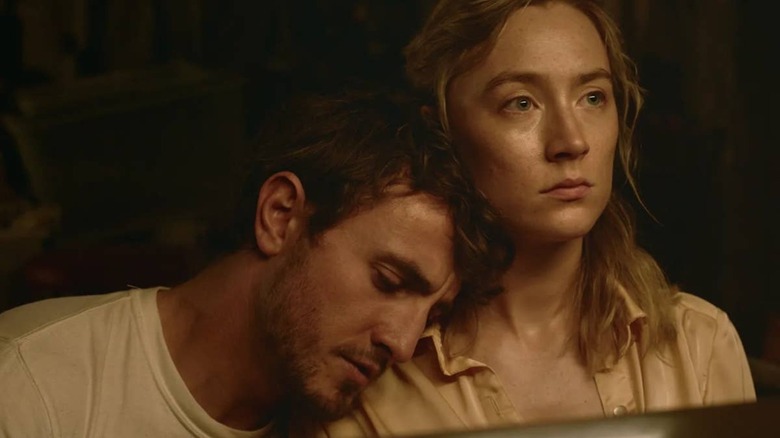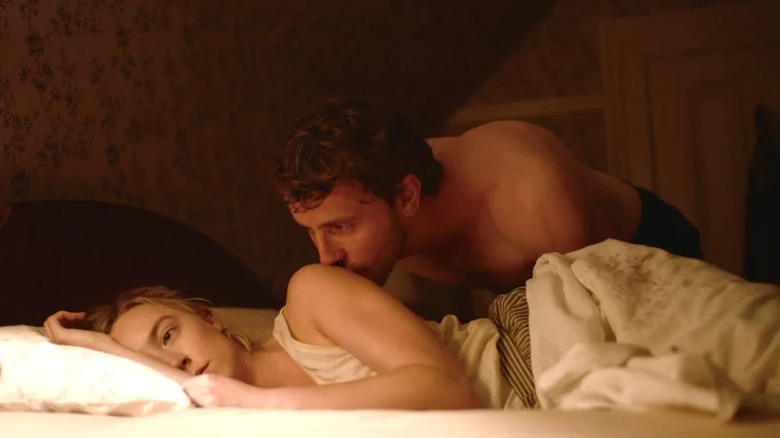Foe Review: A Somber Sci-Fi Snore
Due to the deliberately mysterious nature of the film, potential spoilers for "Foe" follow.
The premise of Garth Davis' turgid sci-fi mope-fest "Foe" is intriguing on paper. It's 2065, and the world is dying. Water and food are in short supply, and the government is experimenting with station-bound space colonies. Junior (Paul Mescal) is to be recruited for a two-year space mission that would keep him away from his long-suffering wife Hen (Saoirse Ronan). In exchange, the government has offered to outfit Hen's home with a pre-programmed clone of Junior, designed to keep her company.
From the premise, one might assume "Foe" plays out like a speculative "Twilight Zone" thought exercise, or perhaps a wicked/fun grim morality tale like one might encounter in "Tales from the Crypt." But, dear readers, let me assure you that "Foe" does nothing intriguing. Indeed, the bulk of Davis' pity party is little more than extended scenes of meandering, embittered, depressed faffing about. Junior and Hen spend their many hours together alternately seething in resentment, only occasionally having infrequent, dreamy, post-(bitter)-coital conversations about the depth of the sky. Davis is attempting a Malickian swan dive, using plaintive shots of a wasted Midwest as a visual conduit for the impermanent nature of romantic connection. The result, however, is decidedly less than. One wonders why these miserable people don't just split up and go on with their lives. As sex advice columnist Dan Savage might say, DTMFA.
Through the slow unfolding of the film's nonsensical sci-fi conceit, Hen and Junior behave increasingly erratically to the point where the audience suspects one of them might be schizophrenic. Admittedly, that would have been a beguiling twist. But, no. That erratic behavior is a sign of ... romance? Mental clarity? What exactly?
Shots of depressed people staring into the middle distance
There is a scene about two-thirds of the way through "Foe" wherein Junior rants about how grossed out he is about humanity, and recalls, in detail, a time when he witnessed a co-worker blow his nose and discard the tissue on his used meal plate. Junior is so disgusted that he begins to question the very function of the human race. Mescal plays the scene with sweat and nerves and jitters, quivering with barely controlled violence. He then begins pounding the wall with his fist, leaving bloodied knuckleprints on the quaint country wallpaper. I suspect Davis wanted this scene to communicate Junior's status as a passionate outsider, a man unwilling to bear the filth of the "normal world" and aching to flee into connubial solitude with his wife. But this scene, and a few other mysteriously violent moments like it, make Junior appear to be on the brink of physical abuse.
Into this gumbo of misery, Davis stirs in a nonsensical sci-fi plot that makes less and less sense the more one thinks about it. A mysterious government agent named Terrance (Aaron Pierce) arrives at Hen's and Junior's door, and Junior immediately assumes he and Hen have been having an affair. Terrance informs the couple that Junior has been conscripted into the space program and that he will be living in space, incommunicado, for two years.
Over the next year, Terrance will come to their home repeatedly to conduct deeply sinister tests on Junior without telling him what they're for. Junior begins behaving more strangely than usual, doing things like running into burning barns and having conversations with beetles. What is Terrance doing to him? And who are those mysterious Men in Black lurking outside the windows?
Undoing what came before
"Foe" has the makings for a bizarre and wonderfully off-putting sci-fi story about mental decline. It has the ingredients to tackle the ethics of cloning, or perhaps merely tell a story about the twilight of humanity (as one might have seen in Christopher Nolan's "Interstellar"). Davis, however, spills all the ingredients on the floor and insists it's a meal. The mood is eye-numbingly dull and its depression serves no function. "Foe" is like drinking a glass of room-temperature dishwater.
Any mysteries the plot may posit are merrily smashed to the floor in favor of a twist that undoes everything. When all is finally revealed, and the true nature of the plot is made plain, none of what came before makes much sense. It seems that Terrance's vaguely sinister behavior and Junior's wild-eyed madness were to be taken at face value.
The above descriptions make "Foe" seem like it's more incidental than it is. Know that a measurable part of its 110-minute runtime is devoted to close-ups of unhappy people. In one scene, Hen, perhaps mimicking Lillian Gish's character from D.W. Griffith's 1919 film "Broken Blossoms," has to physically push her face into a smile to remind herself how to imitate that emotion. It's astonishing that a film can be simultaneously so narratively hazy and also so ham-fisted. Nothing about "Foe" locks together, and I found myself losing patience very early in the proceedings. There is no modulation, no buildup, no catharsis. By the film's end, I was ready for a nap. It is a teabag full of clay steeping in tepid water in an increasingly soggy graham-cracker cup. That's not a drink I want.
/Fim rating: 4 out of 10


